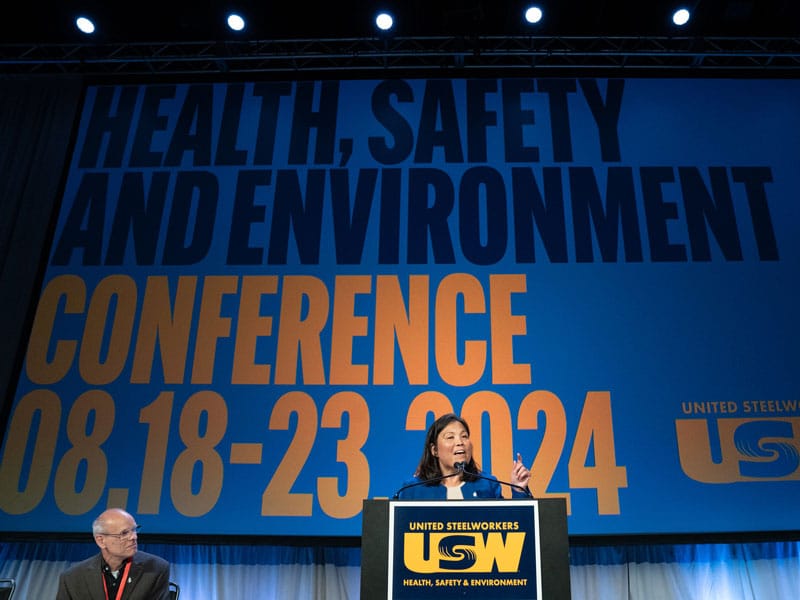California Regulators Fine Refiners for Not Involving Workers in Process Safety Management Planning
Ten months after California’s new Process Safety Management (PSM) rules came into effect, some refiners are having difficulty with the employee “participation” requirement and are interpreting it differently than unions.
Since the refiners have not put the PSM rules into practice, California regulators have issued enforcement actions. The state is seeking over $100,000 in fines for alleged violations at four refineries operated by Chevron USA Inc., Andeavor and Kern Oil & Refining Co.
Meanwhile, Washington State regulators, unions and company officials are watching the situation closely because they are using California’s PSM rules as a model.
The rules were created to make refineries safer for workers and surrounding communities. They specify the steps that must be taken to ensure operations are run safely.
These protections were created after a 2012 fire at Chevron’s Richmond, Calif., oil refinery that sent a cloud of toxic smoke over the city, prompting 15,000 residents to seek medical treatment. The U.S. Chemical Safety Board determined that technical and management failures led to the fire.
Meaning of “Consultation”
A Chevron spokesman told the media that his company finds that some of the PSM requirements are complex and lack clarity. Another Houston lawyer said refiners only have to allow workers to review and comment on proposals, but they do not have to write plans with workers or listen to their comments.
Their views are in stark contrast to those of labor.
“The California PSM rules specify that workers are to actively work with management in developing safety procedures and plans. It is not a matter of management “telling” workers what is going to happen,” said Kim Nibarger, head of USW’s National Oil Bargaining Program.
“Collaborating with workers makes sense because they know how refineries are supposed to operate, have detailed knowledge of plant equipment and processes, and have a vested interest in keeping the plant safe,” he added.
The national and California PSM standards both require that employers consult with employees and employee representatives in developing, implementing and maintaining a written plan for employee participation in all the PSM elements.
After watching California’s PSM rule unfold, Washington State agencies decided to tighten up the employee participation language by requiring employers to collaborate with workers.
Left Out of the Process
Ironically, before the enactment of California’s PSM rules, workers did not have a problem obtaining PSM information from the company, said Michael Smith, a former Local 5 staff representative at Andeavor’s Martinez, Calif., refinery who is now assigned to the USW’s National Oil Bargaining Program (NOBP).
He said companies like Andeavor are curtailing employee involvement by withholding relevant documents, demanding that union officials sign nondisclosure agreements to prevent discussion with other union leaders, and preventing workers selected by the union from participating in safety planning.
The disagreement over worker involvement is causing a delay in the completion of some of the required safety planning elements, Smith said. State regulators are taking notice.
California cited Andeavor’s subsidiary, Tesoro Refining and Marketing Co. LLC, in Martinez, Chevron refineries in Richmond and El Segundo, and Kern Oil & Refining Co. in Bakersfield under the PSM standard.
Alleged Violations
The state cited Tesoro for two general violations: The company allegedly prevented Local 5 representatives access to the rules and standing instructions for the mechanical integrity program. It also allegedly prevented access to a number of PSM documents the union requested. The proposed penalties totaled $1,270.
Chevron’s Richmond plant allegedly committed two general violations with proposed penalties totaling $370. The refiner allegedly did not give employees access to PSM documents; allegedly denied a worker access to employee participation plan development meetings, and allegedly prevented union-chosen workers from participating in PSM teams and other PSM activities.
Chevron’s El Segundo refinery was cited for one general and two serious alleged violations for total proposed penalties of $57,470. The company received a general violation for allegedly not ensuring employee participation by experienced operators, maintenance workers and engineers in a temporary pump evaluation process. Chevron also received two serious citations for allegedly not following PSM requirements during the pump evaluation process.
The state cited Kern Oil for two general and three serious alleged violations of the PSM rules and one serious accident violation over two inspections. The total proposed penalties were $81,270.
Company and state officials said the three oil companies are appealing some of the citations.
By clicking Sign Up you're confirming that you agree with our Terms and Conditions.
Recent News Articles
Want to Learn More?
See how the USW is making a real difference in our communities and our workplaces.

